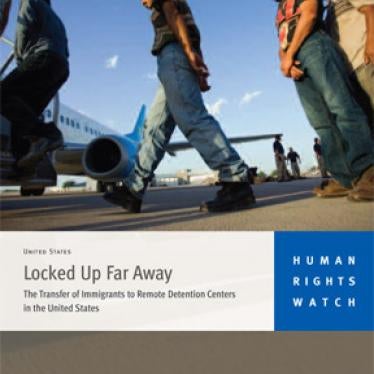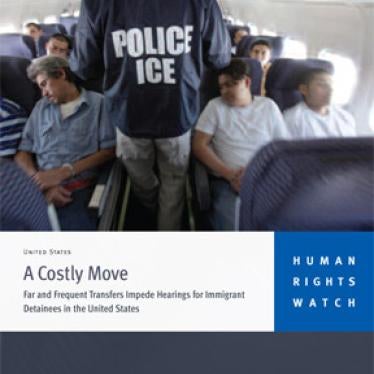Many detained immigrants facing deportation from the US are woken up in the middle of the night and put on airplanes. Their destination: deportation centers hundreds of miles away – far from the moral support of their families and communities.
Hundreds of thousands of detainees are transferred each year, although in many cases it puts their lawyers out of reach and leaves behind their character witnesses. Commonly, detainees are transferred to states that don’t have enough immigration attorneys to take their cases.
It can make building a legal defense against deportation seem impossible.
But after three years of work by Human Rights Watch, the US Immigration and Customs Enforcement (ICE) has adopted a new policy that could substantially reduce the number of transfers, giving immigrants a fairer chance.
Non-citizens are detained by ICE for a variety of reasons: the legality of their presence in the United States could be under dispute, or they may lack valid documentation. Legal residents can be deported after serving a criminal sentence.
With close to 400,000 immigrants in detention each year, space in detention centers, especially near cities where immigrants live, has not kept pace. As a result, ICE built a detention system relying on subcontracts with state jails and prisons that resulted in frequent transfers.
Between 1998 and 2010, the US carried out a staggering 2 million transfers involving 1 million immigrants, according to information provided to Human Rights Watch through a Freedom of Information Act request.
Families are almost never notified of the transfer, sending parents or children into a tailspin when they can’t locate their loved ones.
By comparison, transfers in state and federal prisons are much better regulated and protective of the person’s rights.
The largest number of transferred detainees are sent to Louisiana, Mississippi, and Texas. Courts in these states are widely known for decisions that are hostile to immigrants. Collectively, these states also have the worst ratio of immigration detainees to immigration attorneys: 510 to 1.
As a result, the transfers can violate detainees’ right to fair treatment in court, slow down asylum or deportation proceedings, and prolong the time immigrants spend in detention and the overall cost of detention. In fact, Human Rights Watch found that transferred detainees spend more than three times as long in detention on average as those who remain in the same place.
To better understand the human impact of transfers, our researchers interviewed dozens of detainees, lawyers, family members, and officials. They met asylum seekers who had been separated from their families and spent years in detention, undocumented immigrants who had lost their pro bono counsel when they were transferred, and legal residents who struggled to mount a defense against deportation because their lawyer was thousands of miles away. Many couldn’t find an attorney in the remote locations to which they were transferred.
Our two reports, Locked Up Far Away and A Costly Move, garnered significant media coverage, as did our graphic analysis providing state-by-state trends in detainee transfers. Shortly after the publication of the first report, ICE pledged to change its transfer practices. We continued to meet with ICE officials as well as with members of Congress, discussing the situation in their respective states.
It took two more years of dogged advocacy until the new policy minimizing the long-distance transfer of detainees was put in place.The policy is designed to minimize the transfer of detainees who have family members in the area where they are detained, local attorneys, or pending immigration proceedings.
Going forward, Human Rights Watch will monitor transfers to ensure that ICE’s new directive is being implemented and to see how this changes the lives of immigrant detainees. We will also continue to push more broadly for better protection of immigrants’ rights. Currently, immigrants are not appointed counsel, even vulnerable immigrants like those with mental disabilities or asylum seekers. We want to ensure fair treatment of immigrants, by making sure those who need it most have adequate representation in court.








